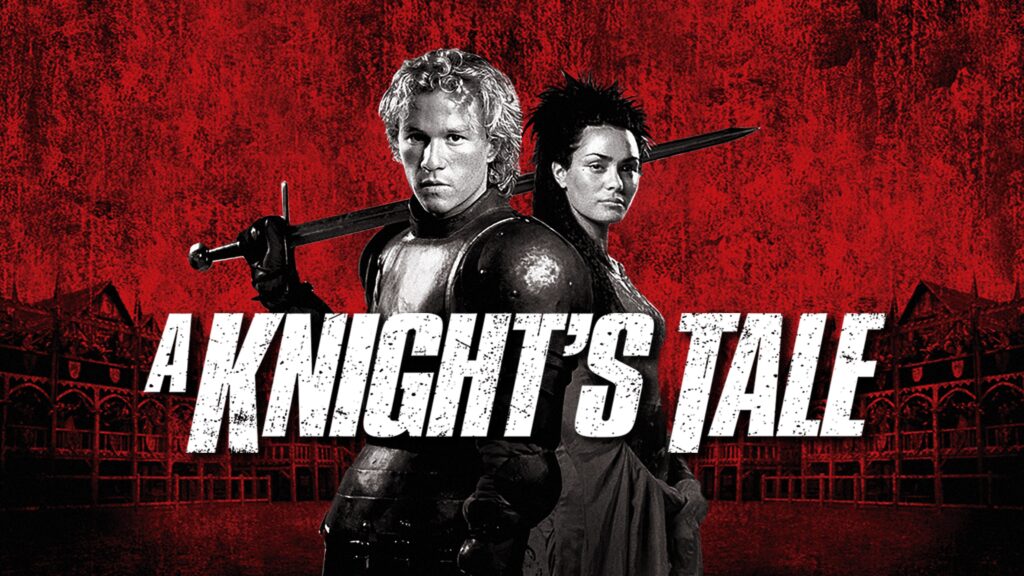
Welcome to Movie Night with Media Services, the brand-new podcast where we discuss our favorite films in the American University Media Collection. For our first episode, we’re revisiting the 2001 film A Knight’s Tale and discussing what makes it so special. You can read the podcast transcript below.
Hi, welcome to Movie Night with Media Services, the podcast where we discuss some of our favorite movies in the American University media collection. I’m Maeve Quigley, the Media Services Coordinator at AU, and I’ll be your host for tonight’s episode.
In this episode, we’re going to be talking about one of my all-time favorite movies: the 2001 cult classic A Knight’s Tale. In this film, Heath Ledger stars as William Thatcher, a peasant who dreams of changing his stars and begins posing as a knight to take part in jousting tournaments. I will keep the first part of my commentary light on the spoilers, but if you have not seen the film yet, I encourage you to do so. We have this film on DVD at the library, so if you are a member of the AU community, you can borrow it for up to one week. If you are not a member of the AU community but are in DC, you can stop by Bender Library and view the DVD on one of our on-site viewing stations. In addition to the film, we have a copy of the shooting script with an introduction by writer and director Brian Helgeland.
Without further ado, let’s get into why I love this film so much. First off: the cast. While the script and production of this film are wonderful in their own right, this movie would not have come to life the way it did without its absolutely charming cast. Heath Ledger puts in a phenomenal and earnest performance in the lead role, and the supporting cast shines with comedy hard-hitters like Mark Addy, Alan Tudyk, and Paul Bettany. Shannyn Sossamon is positively alluring as the Lady Jocelyn and Rufus Sewell plays the perfect antagonist. Each cast member gets their own moment to shine, but the film is at its best when they play off each other, in both comedic and emotional scenes.
The second reason I love this film is somewhat controversial: the anachronisms. If you’ve seen this film, you know exactly what I’m talking about. For listeners who may not be aware, despite being set in the 14th century, the soundtrack for this film is full of classic rock like “We Will Rock You” by Queen and “Golden Years” by David Bowie. While some people were shocked by this when they first saw the film, I feel as though it fits perfectly into the world Brian Helgeland created. In the DVD commentary, Helgeland argues that he wanted to capture the feeling, and not necessarily the exact sound, of the medieval setting. He did a ton of research into medievalism and jousting, and absolutely could have made the setting 100% realistic, but he made an active choice not to. I really like one of his quotes from the shooting script that explains why. He says: “the people of medieval Europe did not live in a museum. They were not trapped under layers of varnish that turned them into dark old paintings to be viewed in passing, never to be connected with emotionally. They were not governed by a general code, whether dress or behavior. They danced to their music the same way we do. They laughed, loved, and lived the same way we do.” This quote made me appreciate the anachronisms on a whole new level. By filling this medieval world with contemporary music and speech, the audience is able to relate to the characters so much more than they would if the world they were watching was one entirely alien to them.
To explain the final reason this film is so amazing, I’m going to have to get into some spoilers. If you haven’t seen the movie yet, stop listening, give it a watch, and come back when you’re done. Now that we’ve all seen the film, I want to talk about how satisfying the narrative is, particularly with its emotional payoffs. While there are a number of different narrative threads running through this film, the one I want to focus on is the relationship between William and his father, a poor thatcher. Throughout the film, Will is insistent that a man can change his stars. We learn that he got that conviction from his father, who sent him off with the knight Sir Ector as a boy to try and give him a chance at a better life. When they finally reunite after 12 long years, it is both tearful and joyous, as Will’s father (now blind), slowly realizes that Will has not only changed his fate, but has come home to him. Although it seems like this is the climax of the emotional journey, as Will has achieved his dream of competing as a knight in the tournaments, the film takes it a step further. Up to this point, Will has been competing under someone else’s name, pretending to be some other man’s son. He may have changed his life, but he hasn’t yet changed his stars. After his identity is revealed and he falls to his lowest point, Prince Edward declares William Thatcher to be of noble birth (in a moment that serves as payoff to another well-laid out thread of respect and camaraderie between the two), and William competes under his own name with his father there to hear it announced. In this moment, William has finally changed his stars. The movie could have had a perfectly serviceable ending of William (as his alias Sir Ulrich) defeating the antagonistic Sir Adhemar, but the script understands the significance of tying up the emotional threads of the story, and Will competing under his own name is a far more satisfying payoff to his hard work and convictions than simply winning the tournament would have been.
Before we end this episode, I want to share a few fun facts about the film. The production was incredibly detailed, and all of the jousting scenes are real. There was a team of stunt doubles who actually rode full tilt and hit one another with lances. The lances, however, were made of balsa wood and were hollowed out and filled with spaghetti and other debris to achieve the dramatic splintering effects. The suits of armor were also real, and were modeled after both medieval armor and modern sporting equipment like football pads. They did switch from metal armor to plastic when stunt doubles were knocked off their horses. Our final fun fact for this film is that prior to A Knight’s Tale, Shannyn Sossamon, who plays the lady Jocelyn, wasn’t a professional actress. She was DJing at a Hollywood party when the casting director approached her and requested that she audition. We’re lucky she did, because the chemistry she has with Heath Ledger brings something truly special to the screen in every scene they share.
That’s all we have for this episode of Movie Night with Media Services. I loved revisiting this film, and I hope you all gained a new appreciation for it. As a reminder, members of the AU community can check out A Knight’s Tale on DVD with special features as well as the shooting script for the film. If there’s another film in our collection that you want us to explore in a future episode, send us an email at mediaservices@american.edu. Until next time!

